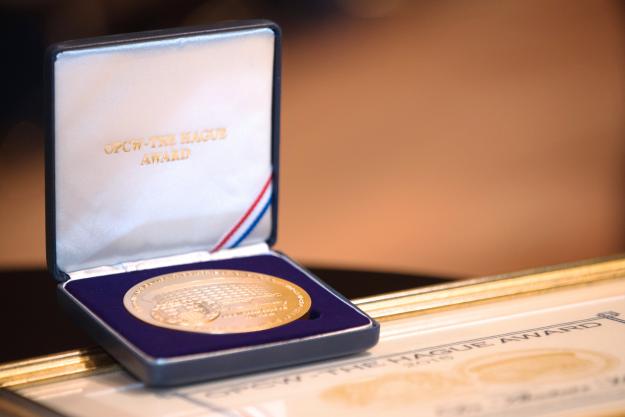
THE HAGUE, Netherlands —20 November 2019 — The Director-General of the Organisation for the Prohibition of Chemical Weapons (OPCW), H.E. Mr Fernando Arias, is pleased to announce the decision of the OPCW-The Hague Award Committee to honour Dr Robert Mikulak (United States of America); Mr Cheng Tang (People’s Republic of China); and the International Union of Pure and Applied Chemistry (IUPAC) as joint recipients of the 2019 OPCW–The Hague Award.
The OPCW-The Hague Award is a legacy of the OPCW receiving the 2013 Nobel Prize for Peace and it recognises individuals and institutions that make an outstanding contribution towards the goals of the Chemical Weapons Convention (CWC). The Award was established in 2014 from the monetary prize accompanying the Nobel Prize for Peace and is supplemented by the City of The Hague .
OPCW’s Director-General, H.E. Mr Fernando Arias, congratulated the award recipients and stated: “This year’s three winners have contributed meaningfully to the Chemical Weapons Convention making progress in permanently eliminating chemical weapons while promoting chemistry for peace. “
While Dr Mikulak and Mr Tang have both been extensively involved in the negotiations of the CWC and have collaborated with the OPCW on a broad range of topics, IUPAC has contributed to providing the OPCW with objective scientific knowledge on emerging areas of science related to the CWC, as well as carrying out education and outreach activities to chemistry practitioners and the general public.
The award ceremony will be held on 25 November in The Hague, during the first day of the Twenty-Fourth Conference of the States Parties to the Chemical Weapons Convention. The ceremony will be webcast from the official OPCW website (www.opcw.org). Media interested in covering the event must apply to accredit with the OPCW by 16:00 CET on 21 November 2019.
Background
The International Union of Pure and Applied Chemistry (IUPAC) is an international federation of chemists that was established in 1919. Consisting of members, associates, and affiliate institutions from around the world, the organisation played an instrumental role in the development and promotion of The Hague Ethical Guidelines on Chemistry. IUPAC has actively cooperated with the OPCW to produce educational materials, teaching modules and joint-OPCW symposia on CWC related topics. A strong advocate for the peaceful uses of chemistry, IUPAC has provided extensive and longstanding support to the OPCW in promoting the objectives of the CWC.
Mr Cheng Tang (People’s Republic of China) is an expert on chemical demilitarisation. He is currently the Chair of the OPCW Scientific Advisory Board (SAB) and an advisor to the Chinese National Authority. . Involved in the text negotiations of the CWC in Geneva from 1990 to 1992 as well as the removal and destruction of Syria’s chemical weapons, Mr Tang has actively worked for the goal of a world free of chemical weapons.
Dr Robert Mikulak (United States of America) is an eminent expert on chemical and biological weapons arms control and the former Permanent Representative of the United States to the OPCW from 2010 to 2015. Dr Mikulak has made substantial contributions to chemical disarmament through his extensive involvement in the negotiations of the CWC, and his work as the US representative to the OPCW Preparatory Committee. Currently, he is a member of the OPCW Scientific Advisory Board (SAB) and is an expert advisor on chemical and biological weapons issues at the United States Department of State.
As the implementing body for the Chemical Weapons Convention, the OPCW, with its 193 Member States, oversees the global endeavour to permanently eliminate chemical weapons. Since the Convention’s entry into force in 1997, it is the most successful disarmament treaty eliminating an entire class of weapons of mass destruction.
Over 97% of all chemical weapon stockpiles declared by possessor States have been destroyed under OPCW verification. For its extensive efforts in eliminating chemical weapons, the OPCW received the 2013 Nobel Peace Prize.
